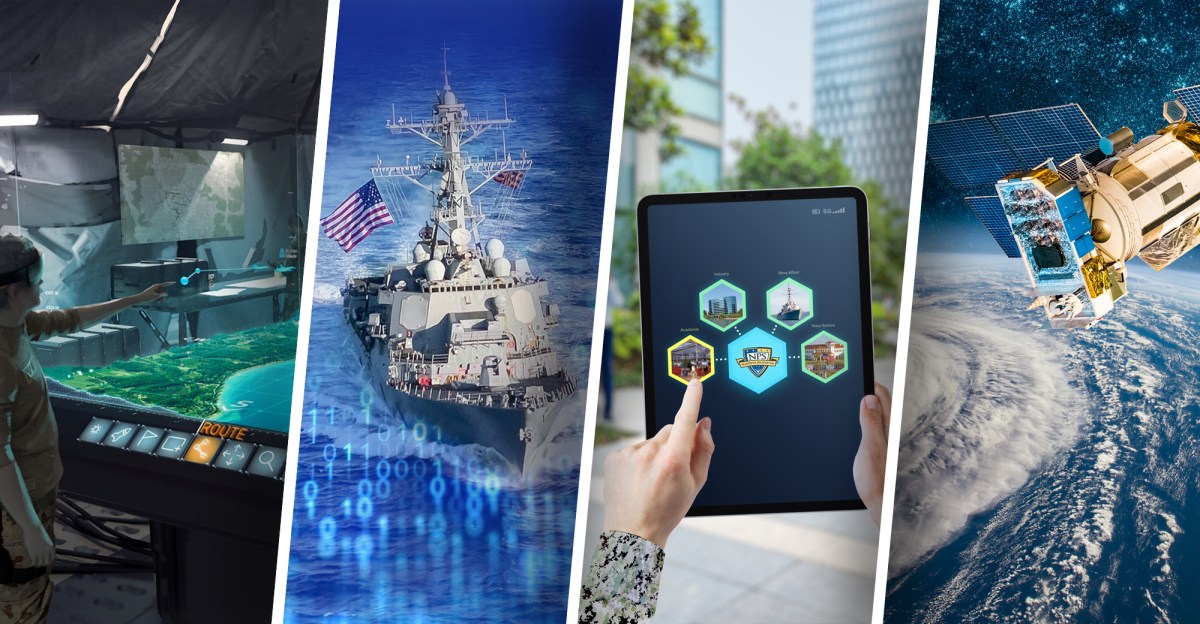Navy, Microsoft team up to figure out ‘what’s possible’ with emerging tech

The Naval Postgraduate School is formally partnering with Microsoft to jointly explore how cloud services, edge computing and other emerging technologies can be more rapidly adopted and integrated for modern national security missions.
Engineers from the company will work shoulder-to-shoulder with students and researchers from the NPS to evolve commercial capabilities intended to help solve complex operational challenges increasingly faced by U.S. military forces — all via a new Cooperative Research and Development Agreement (CRADA) announced on Monday.
“Microsoft is going to help us with establishing four collaborative spaces within the space on the campus — the first time it’s ever been done. And in those, they will bring their capability and we’re going to bring our own capability when it comes to the military person who’s in there,” NPS President and retired Vice Adm. Ann Rondeau told reporters on the sidelines of Microsoft’s National Security Symposium. “I can’t tell you what that means for ‘cool stuff.’ But I can tell you what it does mean for cool activity, and that is people exchanging ideas and exchanging questions with each other [saying], ‘Gee, I wish, I wonder, I guess let’s try it out.’”
Microsoft Executive Vice President Jason Zander said: “We’re definitely bringing cool stuff.”
As official agreements underpinning professional exchanges of ideas and resources, CRADAs provide a legal framework enabling different entities to cooperatively engage with one another for educational purposes and to enhance operations. Funds, personnel, services and facilities can be provided and shared more seamlessly in such efforts.
“We have many different kinds of CRADAs. We have CRADAs that individual researchers and faculty in NPS have with a number of companies,” Rondeau explained. “Institutionally, though, this is really a different kind of scale, because this is institution to institution.”
NPS operates as both a Navy command and an academic institution. Its employees provide military-associated graduate education courses — including those involving classified studies and interdisciplinary research — to advance the operational effectiveness and technological leadership of the Navy’s enterprise.
More than 17,000 students engaged with the school in 2021.
“This partnership with NPS is something I’m excited about because, in particular, obviously we can work with the next up-and-coming leaders and researchers. I have a bunch of [doctoral students or] PhDs, the admiral has a bunch of PhDs. I’m looking forward to getting those folks together, just to see what we can actually accomplish together,” Microsoft’s Zander said.
Through this CRADA, the Naval Postgraduate School will tap Microsoft’s cloud services, like Azure, Office 365 and Teams, to accelerate what officials called an ongoing digital transformation journey within the school. Those efforts will come as the tech giant vies against three competitors for a spot on the Pentagon’s Joint Warfighting Cloud Capability contract.
According to a press release, officials involved will also cooperatively research new uses for cloud-enhanced networks and edge computing, and work to extend the delivery of NPS expertise and coursework deeper into the fleet and force digitally. Further, the institutions will conduct joint research into how gaming, exercising, modeling and simulation can improve military capability development and enable quicker decision-making for Navy and Marine Corps commanders.
During the roundtable, Zander noted that one of the main assets Microsoft will provide early on is its Xbox video gaming technology.
“It’s not so much even about the console because it turns out that a lot of the hardware that we run the Xbox on we’ve actually turned into datacenter versions, which means that for some of the exploration and simulation it’s actually hardware that’s sitting locked up in a datacenter, like a normal sort of cloud,” he said. “We will definitely bring that tech in, because again, we want to experiment with it.”
Microsoft’s HoloLens mixed reality smart-glasses will be among other gear provided early on to NPS in this partnership, officials said.
The school will also connect to the new Azure Stack cloud computing offering.
An in-development prototype discovery tool that will allow officials to find all completed and ongoing research projects, as well as unanswered research pursuits worth working on, will also be integrated into the NPS Teams platform later this summer.
At this point though, collaboration pipelines are just starting to get up and running and Zander noted that there are no timelines set or hard dates to announce for the delivery of prototypes or products just yet.
“To me, a bunch of this is about figuring out what’s possible,” he said.
Microsoft’s motivation here isn’t to figure out items to “turn around and sell,” he added, but to learn and grasp more about what technology is relevant — and where.
In Rondeau’s view, for NPS this collaboration offers many prospects — like the making of a “dream team,” and a deeper shared trust between the organizations.
“There is an intellectual magic here that is extraordinary,” she said.



